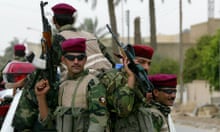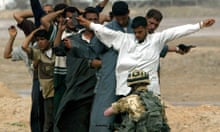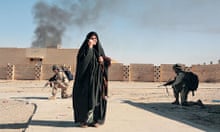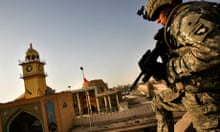All information about the deaths caused in any disaster, be it a man-made war or a natural catastrophe, is public information which no state has a right to withhold indefinitely. Even in military circles, the latest thinking accepts this view, for a variety of reasons that include its own best interests. We argued exactly this point in a recent article in the British Army Review, co-authored with a British Army colonel.
The Iraq war logs contain information on civilian and other casualties that has been kept hidden for more than six years. Also concealed has been the fact that these logs record the names of thousands of Iraqi civilian victims. Whether or not this data is "stolen" from the US military, as a spokesman has asserted, is beside the point. The pertinent fact is that the data on casualties contained within these logs is information about the public (mainly, the Iraqi public) that was unjustifiably withheld by the US government from the public, for reasons that remain unstated.
Since the 2003 invasion, Iraq Body Count (IBC) has systematically recorded not just the mounting number of civilians killed in Iraq, but many of the connected details. These have included the time, place and other circumstances of each death and, whenever possible, the name and demographics such as the age, sex and occupation of the dead. Consequently every record in IBC's public database is open to scrutiny, correction (where necessary) and verification. Most importantly, in the context of the Iraq war logs, this detailed level of recording allows IBC's information to be compared and reconciled with new data as it emerges.
Our detailed, incident-level analysis indicates that the Iraq war logs are likely to add some 15,000 previously unreported deaths of civilians and police to public knowledge. This is despite the fact that the logs contain a lower total number of civilian deaths than those in IBC's count for the same period of the conflict. This is because the logs miss many deaths that IBC has recorded.
Discovering such previously undocumented deaths would have been impossible if the deaths contained in the logs had been presented as simple totals, as is the norm for official announcements or publications of casualty data. Without sight of the incident-level and victim-level details in the logs there is simply no way to establish how such data truly compares to existing sources.
From our systematic evaluation of 760 of the logs (including all of those listing more than 20 victims, together with a stratified sample of the many more logs describing smaller incidents), we have already found 113 hitherto unreported victim names, as well as new demographic data for 298 victims. Most victim names appear to be attached to the smaller incidents where one or two people were killed, and which form by far the largest proportion of logs containing casualty data. Retrieving all of the victim names that may be present in all 390,000 logs will require much more work.
But like the other casualty details in the Iraq war logs, these names too belong in the public domain – as a memorial to the dead, and public recognition of the loss suffered by their families. Only a list of named individuals, visible to all including those who knew them in life, can ever provide full verification, without omissions or duplication, of the death toll of this war.
It is time for governments to realise that the early, voluntary release of casualty information in the conflicts they are embroiled in is the correct thing to do, both from a moral and a pragmatic standpoint. Whatever is holding them back is surely a minor concern when set against the public's right to know the immediate human consequences of war.





